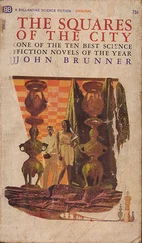By dawn on October 7th, authorities were still scrambling to quietly clean up the mess from the night before. Meanwhile, East Germany’s general population was settling in for the beginning of their national holiday, the GDR’s 36th birthday. With Scharf dead and his men on the run, no Stasi agents stood watch for a certain young blonde woman at the border checkpoints.
The guards at the Oberbaumbrücke checkpoint didn’t cast a second glance at the middle-aged blonde woman who approached on foot. She had a scarf over her head, covering almost all of her hair and revealing her fine but well-worn features. Her off-white coat seemed too stylish for the GDR, but as she carried a West Berlin passport, they deduced she had brought it in with her. The woman was processed through customs and the last security checks, then allowed to walk westward on the Oberbaumbrücke bridge.
In the early morning fog, the sky and Spree River melded into one solid mass of gray. Only the red Brick Gothic structure seemed to separate the mire. The bridge’s two castle-like turrets, heavily damaged during the war, stood gaping like broken teeth. Their pinnacle roofs had never been rebuilt, and now, in the dewy mist that flowed off the river, the towers seemed like the ruins of a fairy tale castle, waiting to be dissolved by the fog of a forgotten dream.
A man stood just beyond the western end of the bridge and waited. He was dressed in a black overcoat, its left sleeve hanging empty. His arm was tucked under the coat in a sling. Not far behind him, an American military police officer waited next to a sedan. As the woman approached, the man spotted her white coat, then watched her emerge from the mist. The man and woman saw each other and exchanged a smile. When she reached the end of the bridge, the woman ran to the man and embraced him. The couple walked arm-in-arm away from the checkpoint into West Berlin.
“You look tired Hans,” the woman said.
“So do you,” he said as he helped her into the back of the sedan.
Anna touched her face and laughed. “Mason’s men did a very good job with the makeup, don’t you think? Wasn’t even a problem with the guard’s facial recognition system.”
Hans put his weary good arm around Anna as the sedan began to move. “Who do you think gave Mason that system, huh?”
The American MP drove them to Tempelhof airport, the center of American air operations in Berlin.
That afternoon, while the GDR’s Republic Day Parade went off without a hitch, Hans and Anna flew on an American military plane to Iceland. There, they were taken from a NATO base to a secret CIA safe house. Both were given medical attention for the injuries and strain they had suffered during their ordeal. Then their debriefing began. The CIA Deputy Director came out to personally supervise the proceedings. Anna’s debriefing lasted two and a half days. Hans’ lasted much longer.
The CIA tried to preserve the purity of Hans’ and Anna’s statements by questioning them in separate rooms. At first, Hans was cooperative; he answered each of their questions to the best of his ability and filled in as many details as possible. He even tolerated going back through everything again, and again, until he had explained the same story ten times over. After two weeks, Hans had enough. He told the CIA officers he was not a prisoner, and demanded that he and Anna be allowed to leave. With some reluctance, the Deputy Director agreed.
Hans wanted out of any intelligence work, and refused to take a leave of absence before he was given another assignment. He was burned out, he explained, from living a cover every hour of the last fifteen-some years of his life. He wanted a clean break, and wasn’t going to change his mind. The Deputy Director helped arrange for a $500,000 lump-sum pension. Anna also wanted out, and together they left the CIA safe house, ready to start a new life.
The first step Hans took was to obtain a new name. With his cover no longer necessary, he reverted back to his birth name Jack Holt. It took Anna some time to get used to the name—and since he hadn’t used it in fifteen years, it took Jack some time too.
Jack and Anna spent Christmas with her family in Wuppertal, West Germany that year. In February 1986, Jack and Anna solemnized their marriage for her family in a small resort village in the Bavarian Alps. Their initial wedding had taken place in secret nearly two years before, while still working under cover. This ceremony gave Anna’s family a chance to celebrate with them.
Liberated from the constraints of their life in intelligence work, Jack and Anna decided to take not so much a honeymoon, but a worldwide expedition. They traveled the world for the next year and a half, trying to experience as many exotic locales as possible. They lived off Jack’s pension, living adventurously, but not extravagantly. They traveled to Asia, where they visited Japan, Hong Kong, Malaysia, and Thailand—they avoided Korea, not wanting to set foot in another divided country. Before long they had visited New Zealand, Australia, the edge of Antarctica, Brazil, and Africa. Finally, in the fall of 1987, having spent nearly a third of Jack’s pension, they decided to settle in the U.S. Jack took a job as a security consultant, using references from the CIA. Anna took a job as a translator. Jack’s job was short-lived—he didn’t like how the constant cross-country travel kept him and Anna apart; even worse was how the job constantly reminded him of his life as a spy. By December 1988, just weeks before the terrorist bombing of Pan Am 103, Jack quit.
Anna had always encouraged Jack to explore his own interests, so in January 1989, he began to work as an artist and carpenter. Anna had introduced him the previous summer to a local artist who recognized Jack’s talent and helped mentor his skills. The carpentry, however, was largely self-taught. Jack had an eye for detail—a skill he had long developed in intelligence work—but here he put it to a completely different and creative use. He felt a simple, intrinsic pride in his work, and quickly began to build everything from furniture to housing additions. Gradually, he began to build a profitable business, one that immensely satisfied him. He forged his own path, a clean break from his previous life, and was working in a productive pursuit.
Yet Jack and Anna still sought greater solace. They moved away from city life to a home in the Midwest. It was an isolated but beautiful location, deep within woods and overlooking a lake. Anna continued to work in translation, but only on written documents from home. Jack now had a natural setting where he could feel at ease and work in peace, exorcising his previous existence. In February, Anna learned she was pregnant. She and Jack now felt they would move past their old lives forever. As they waited for their family to grow, they embraced the simple intimacy of their time together as a couple. In the summer, they spent two weeks in a cottage at Lake Michigan. They listened to the water lull them to sleep at night, and woke early to watch the sunrise.
In November 1989, Jack and Anna went to the hospital to await the birth of their son. The nurses sent Jack out of the delivery room for a moment as they helped Anna with her labor. Jack went to the waiting room, a wasteland of empty chairs. In the corner, a dozen people were crowded around a television, watching wide-eyed. Jack made his way toward the crowd and looked up at the television. While the images stunned everyone, Jack stared the most in disbelief.
A live news shot was showing the Brandenburg Gate at night. Hundreds of people were crowded on top of the Wall, dancing, singing, hugging, and drinking. It was as if Berlin was experiencing its biggest party ever. A caption at the bottom of the screen read, Berlin Wall Opens . The news anchor recapped how the scene transpired while the boisterous crowd cheered in the background. Apparently a GDR spokesman had announced that all travel restrictions were to be lifted, and people had flocked to the border en masse to see if it was true.
Читать дальше












